Photos courtesy of Zoe Dubelier ’23, Hannah Foley ’23, and Minnie Madden ’26
Following the faculty-led rally, which saw the largest single-event turnout of the week, students marched across campus to continue voicing their opinion. This walking protest was a style not yet utilized during this movement, a style that allowed students to direct frustrations at the places in which they stood. The protest started at Fanning and included stops at Admissions, President Bergeron’s house, Blaustein, Cro, and Becker House.
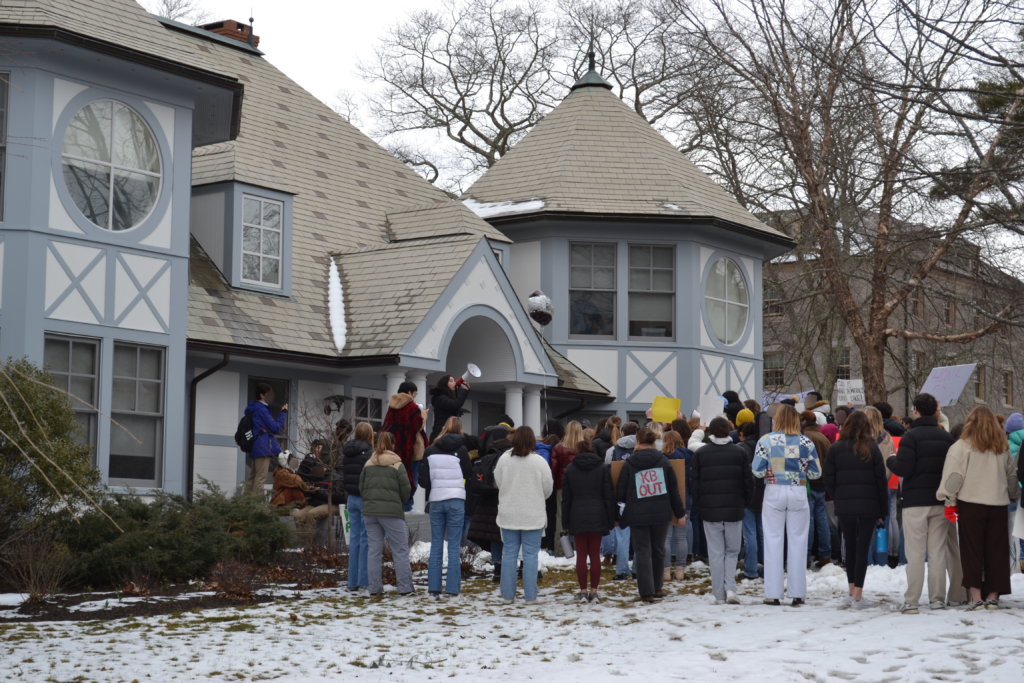
Students outside of Admissions chanted, “Conn is a catfish, admissions is deceitfulness!” This outlined a general feeling that the College is performative by nature, promising prospective students a slew of amenities that it is not able to provide. This sentiment has been a hallmark of the ongoing movement, and focuses on the general lack of support for minority students at the College.
Conn admitted 661 students for the class of 2026, making it the largest class in the history of the College. While more students could have led to a more diverse group of people and perspectives, it instead exposed many deficiencies at the College. Common rooms were converted into large dorm rooms, which, alongside the Manwaring experiment, exposed a lack of adequate housing. More students also require more staffing and support systems, which have crumbled at the College in recent years. Along with the fundraising event at the Everglades Club, Rodmon King resigned due to a general lack of support across all offices of DIEI, which are understaffed, underpaid, and physically decaying. The massive size of the class of 2026 continued to put pressure on DIEI, as an increased population leads to increased needs, weighing down many of its offices until they literally and figuratively cracked.
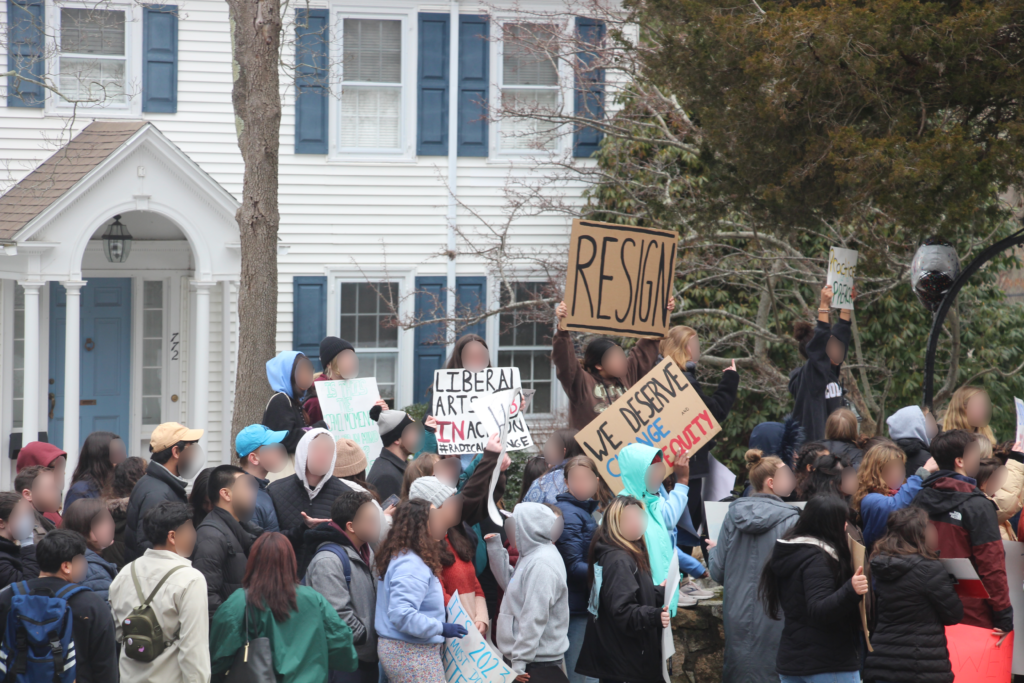
Students then moved across Chapel Green from Admissions toward Bergeron’s house. This property is owned by the College and is often used to host events involving the president, though it is widely doubted that she lives there on a regular basis. Immediately upon arrival, a balloon reading ‘Happy Retirement’ was strung on the fence directly in front of the house. Multiple shirts from Monday’s sewing protesting project were hung on the fence surrounding the arboretum that borders Bergeron’s residence. Next to each other, the shirts read “No Justice No Peace.” Students lined both sides of Williams street while chanting, “Whose streets? Our streets!” Cars timidly drove by, some of which honked their horns to the delight of the student body.
One student, a senior, gave testimony calling back to their sophomore year. During the peak of the COVID-19 pandemic, Bergeron mysteriously announced an event to be held on Tempel Green in which she would proclaim the biggest announcement in college history. Ignoring the College’s social distance regulations for the event, Bergeron announced, among much pageantry, a $50 million donation to the College. This money was to be used across four sectors: financial aid, athletics, career services, and campus improvements. The student speaker questioned why students who struggle to afford Conn’s tuition are, in turn, working multiple jobs and scraping by with constant holds on their accounts, resulting in the inability to choose classes in a timely manner and the exclusion from social events. The community questioned where this money has gone, and though it takes time to implement large-scale change, why is the current student body is financially struggling despite donations of this size?
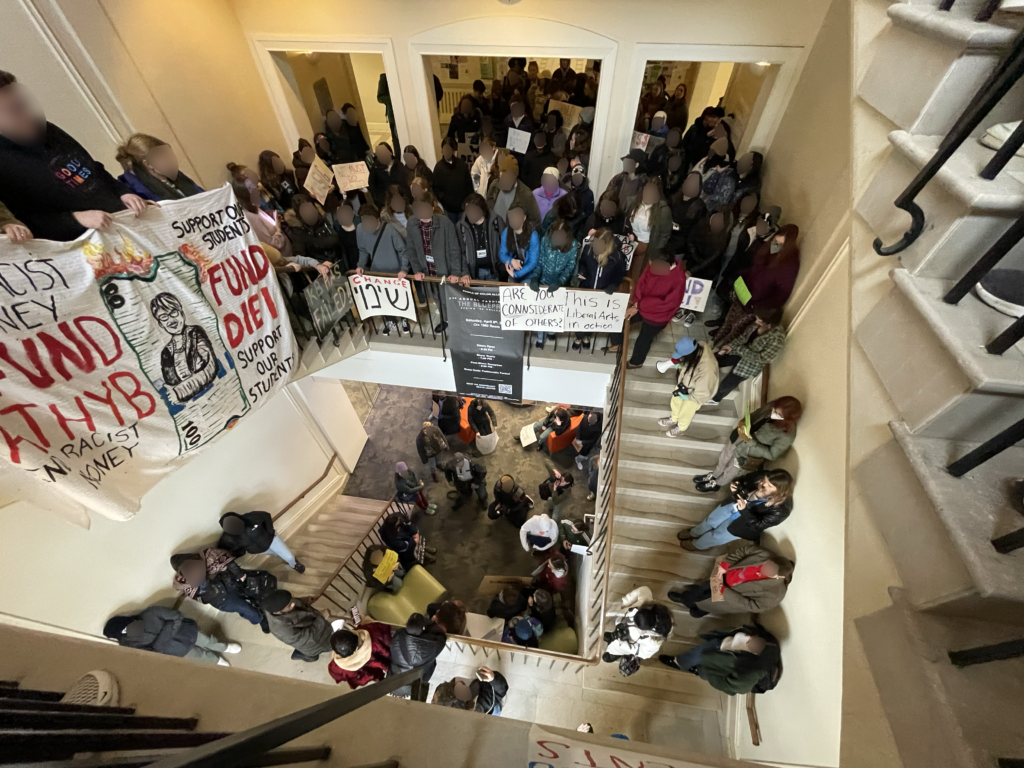
Demonstrators then descended upon Blaustein in one of the movement’s most powerful moments. Staged in the main lobby of the building, which contains a layered three story staircase and platform, students huddled together in close proximity. The close quarters made for good acoustics and powerful speeches.
Blaustein, home to the Walter Commons Office for Global Engagement, is the unofficial home of the Center for International Studies and the Liberal Arts (CISLA), a hallmark of Conn’s Connections curriculum. One testimony was focused on a students’ experience with CISLA, highlighting the Western-focused curriculum which perpetuates a colonial-based mindset. This testimony also talked about the lack of accountability within CISLA to deal with the use of the N-word in class and the lack of support for its diverse group of CISLA students.
The final testimony at Blaustein was given by an international student, a group that has largely been silenced during this movement due to their lack of protection regarding the right to protest and concerns over their scholarships and student-visas. This fear speaks volumes to the culture of the College. This student expressed their gratitude to the College for the opportunity it provides, but was critical regarding their treatment of international students. From the very first day at Conn, this student lacked the basic dorm room needs that they expected to be there, like bedding. During the pandemic, international students, under great fear of deportation and the frightening xenophobic comments of former president Donald Trump, felt like a forgotten group. They concluded by sharply criticizing the College’s performative act of lining Tempel Green during convocation and commencement with the flags of each of its international students, another symbol of unsubstantiated pride.
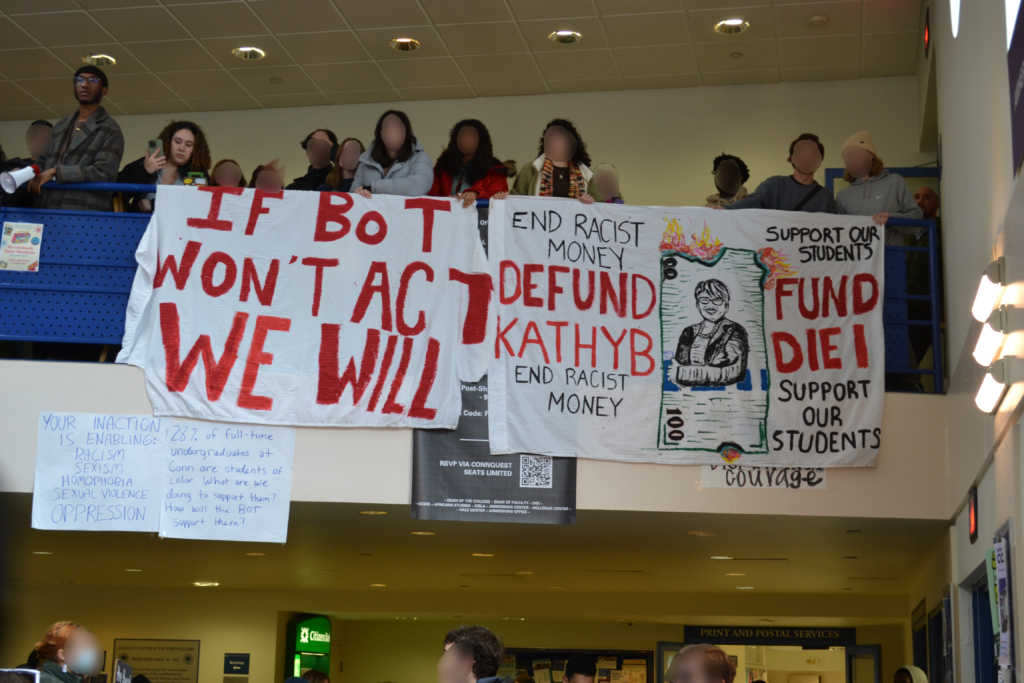
The next stop, the quickest of the day, was at Cro. Students took time to highlight the amazing things that happen in the student center, including the official headquarters of The College Voice, the SGA office, and the Holleran Center. They next highlighted the offices of Title IX Office and Sexual Violence Prevention and Advocacy (SVPA), both of which have seen a revolving door of overworked and underpaid staff members. They chanted, “Community, diversity, and equity, but all we see are disparities.”
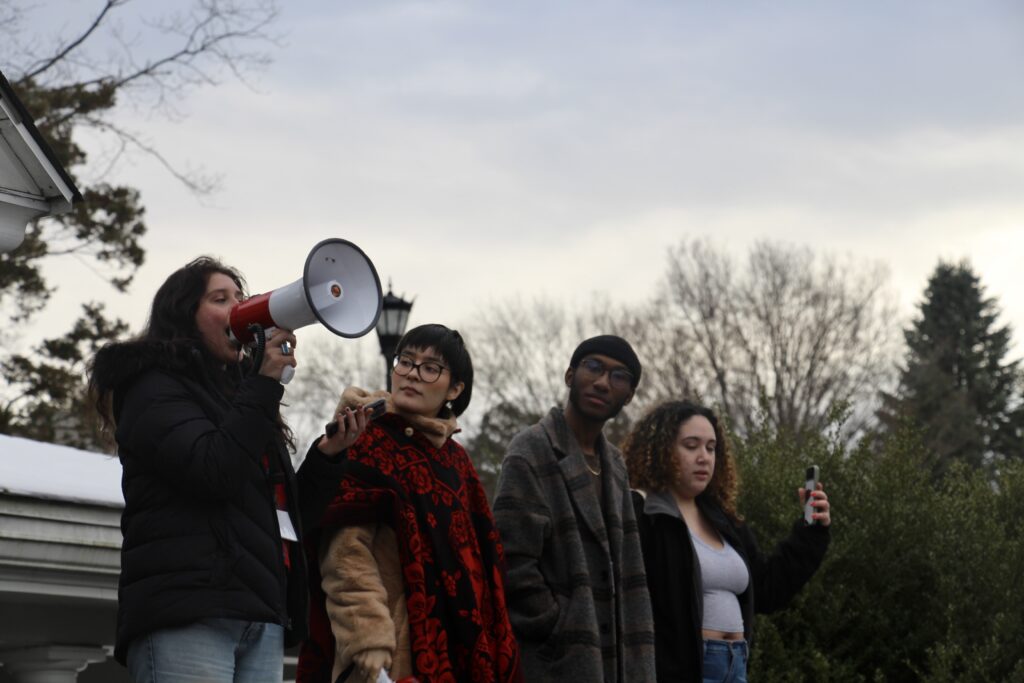
Finally, students stopped at Becker, home of the advancement office. While lots of attention has been focused on Bergeron herself, she likely did not plan the event at the Everglades Club; the details of fundraising events fall under the jurisdiction of the office of advancement. Becker was also the site of an attempted lock-in on Sunday, Feb. 26. This attempt was prevented by campus security, who’s presence at the building made it unsafe for the group of student occupiers to enter. One testimony focused on that night, in which a student described their experience being chased by campus security, who did not identify themselves as such. Students gave further testimonies about their experience working in advancements, while praising two BIPOC staffers who actively work to promote forward-thinking change at the office.

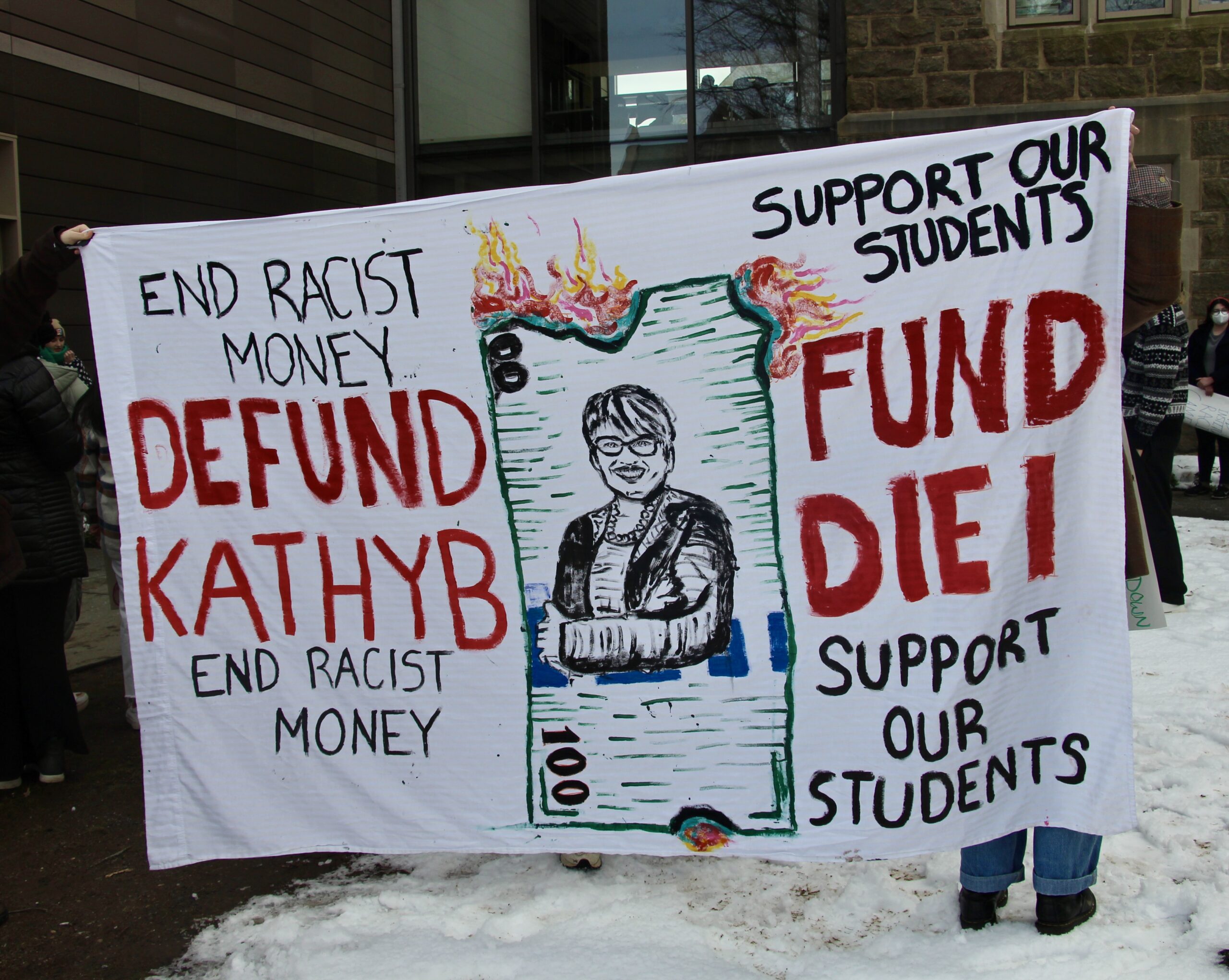









Really? No peace because KB was going to accept money from a country club that was racist 50 years ago? And you want no peace because of that? I suppose it’s easy to say when you are living in a private liberal arts campus. Maybe visit Baltimore or Detroit and stay there for a week and see if you still really want “no peace”. Do you guys hear yourselves?
If you had actually read this article and all of the issues students are facing, or the other articles where faculty talk about the issues they’re dealing with that are unaddressed by KB, you’d know it’s not just about the club fundraiser. That was just that final straw in a series of significant problems that have now boiled over. Interesting how you mention the club fundraiser as being the only thing the protests are about and yet this article only briefly mentions it once. And the “no peace” portion here is referring to the disruption they’re causing, not actual violence, so don’t draw unfair comparisons to what’s happening elsewhere. Otherwise, you’re just interjecting national politics into campus-specific issues.
You could not be more wrong, Alum ’80… I am a student and this protest is 100% overblown, immature, and pathetic.
KF 2001 could not be any more accurate in his take! The student body is lazy, juvenile, and will do anything to promote identity politics while ardently complaining about “privilege”
I take it the “Slow Change, Slow Violence” sign someone had wasn’t comparing this to actual violence, either? Words… mean things.